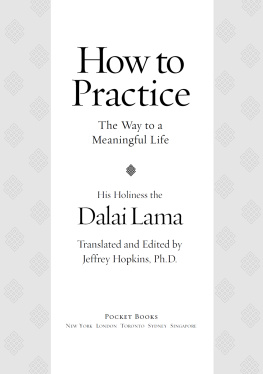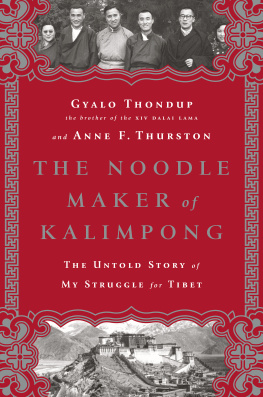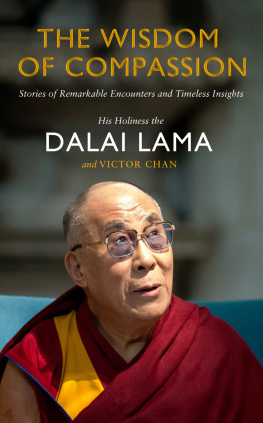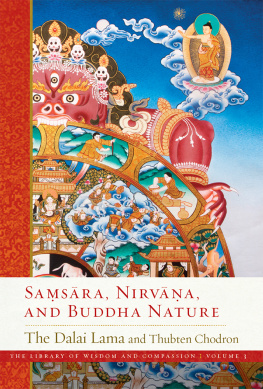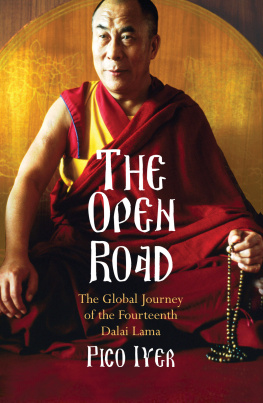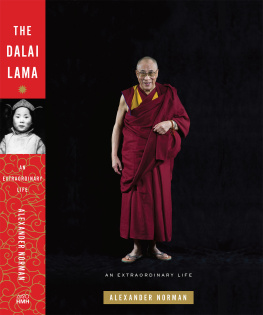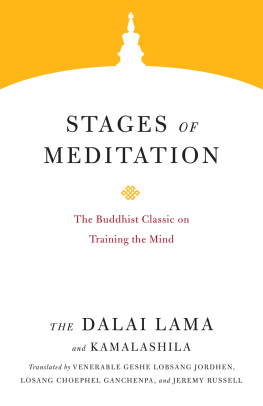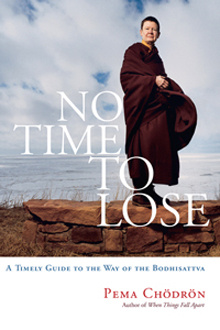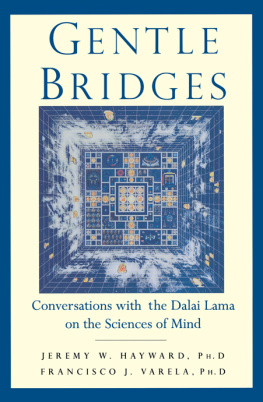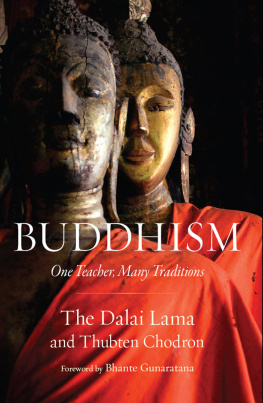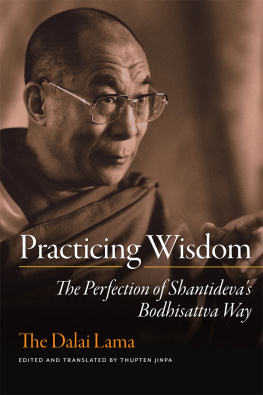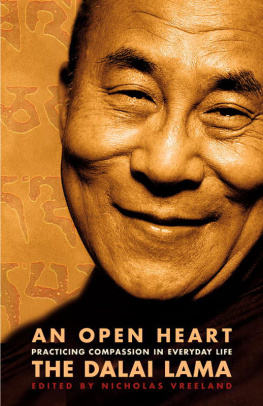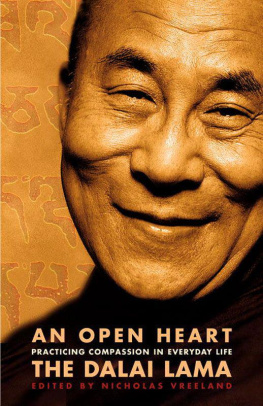Thank you for downloading this Atria Books eBook.
Join our mailing list and get updates on new releases, deals, bonus content and other great books from Atria Books and Simon & Schuster.
C LICK H ERE T O S IGN U P
or visit us online to sign up at
eBookNews.SimonandSchuster.com
We hope you enjoyed reading this Atria Books eBook.
Join our mailing list and get updates on new releases, deals, bonus content and other great books from Atria Books and Simon & Schuster.
C LICK H ERE T O S IGN U P
or visit us online to sign up at
eBookNews.SimonandSchuster.com
Contents

Foreword

I first heard His Holiness the Dalai Lama teach in 1972. Just three days after my arrival in Dharamsala in northern India he started a sixteen-day lecture series for four to six hours each day on the stages of the path to enlightenment. I had begun studying Tibetan and practicing Tibetan Buddhism in 1962, and my teachers, particularly gifted in the intricacies of Tibetan commentaries, had prepared me for study with Tibetan refugee scholar-yogis in India. But, to be frank, I did not think that a governmentally appointed reincarnationborn in northeastern Tibet in 1935 and recognized through prophecies, visions, extraordinary occurrences, and tests as the Fourteenth Dalai Lama at the age of twocould possibly live up to the billing.
However, I was amazed.
He spoke on a wide range of topics concerning the path to enlightenment, capturing my mind and heart with concepts, large and small, that clarified issues long unresolved, expanded on others, and drew me into new areas of understanding.
In Tibetan the Dalai Lama speaks with such great speed and clarity that it was impossible for me to be distracted. Once, he became particularly inspired while describing the reflections for generating compassion. His voice rose in pitch to a level that he jokingly described as his goat-voice, in which I heard the inspired absorption of a poet. During that series of lectures he presented the full range of practices leading to enlightenment, often juxtaposing topics that others leave in isolationall this with the depth of a philosopher. The same dual voice of poet and philosopher is present here in this book, sometimes touching the heart with moving descriptions of the condition of life and the beauties of altruism, and at other times making careful distinctions about profound practices like meditation on emptiness, which serve as nourishment for years of contemplation.
At the age of five the Dalai Lama was brought to Lhasa, the capital of Tibet, where he underwent the full curriculum of monastic training. Due to the Communist Chinese invasion of eastern Tibet in 1950, he suddenly had to take the reins of Tibetan government at age sixteen. Despite attempts to cooperate with the invaders, he was faced with imminent, personal danger and escaped to India in 1959. In exile, he has successfully re-established centers for the broad range of Tibetan culture. He has traveled extensively throughout most of the world, bringing a messagenot just to Buddhists and other religious believers, but to everyoneabout the importance of kindness to the very fabric of society. In recognition of his untiring efforts on behalf of Tibetans and all peoples, he was awarded the Nobel Peace Prize in 1989.
His Holiness has published many books, some for a general audience and others for those particularly interested in Buddhism. In this book he draws on a long tradition of spiritual practice in Tibet and on his own experience to offer suggestions on how to practice a spiritual path that will lead to mental clarity and emotional transformation. In this way, he shows how life can be made meaningful.
Throughout the thirty years that I have known him and during the ten that I served as his chief translator on lecture tours in the United States, Canada, Indonesia, Singapore, Malaysia, Australia, Great Britain, and Switzerland, I have witnessed his embodiment of these practices to the very core of his being. It is important for us to recognize that this insightful, compassionate, humorous, and marvelous person rose from Tibetan culture. We need to value that culture as one of the worlds great wonders.
Jeffrey Hopkins, Ph.D.
Professor of Tibetan Studies,
University of Virginia
Introduction
The Need for Peace and Kindness

I travel to many places around the world, and whenever I speak to people, I do so with the feeling that I am a member of their own family. Although we may be meeting for the first time, I accept everyone as a friend. In truth, we already know one another, profoundly, as human beings who share the same basic goals: We all seek happiness and do not want suffering.
T WO W AYS TO H APPINESS
There are two ways to create happiness. The first is external. By obtaining better shelter, better clothes, and better friends we can find a certain measure of happiness and satisfaction. The second is through mental development, which yields inner happiness. However, these two approaches are not equally viable. External happiness cannot last long without its counterpart. If something is lacking in your perspectiveif something is missing in your heartthen despite the most luxurious surroundings, you cannot be happy. However, if you have peace of mind, you can find happiness even under the most difficult circumstances.
Material advancement alone sometimes solves one problem but creates another. For example, certain people may have acquired wealth, a good education, and high social standing, yet happiness eludes them. They take sleeping pills and drink too much alcohol. Something is missing, something still not satisfied, so these people take refuge in drugs or in a bottle. On the other hand, some people who have less money to worry about enjoy more peace. They sleep well at night. Despite being poor in a material sense, they are content and happy. This shows the impact of a good mental attitude. Material development alone will not fully resolve the problem of humanitys suffering.
In this book I offer you, the reader, valuable techniques from Tibetan traditions which, if implemented in daily practice, lead to mental peace. As you calm your mind and your heart, your agitation and worry will naturally subside, and you will enjoy more happiness. Your relationships with others will reflect these changes. And as a better human being, you will be a better citizen of your country, and ultimately a better citizen of the world.
K INDNESS
We are all born helpless. Without a parents kindness we could not survive, much less prosper. When children grow up in constant fear, with no one to rely on, they suffer their whole lives. Because the minds of small children are very delicate, their need for kindness is particularly obvious.
Adult human beings need kindness too. If someone greets me with a nice smile, and expresses a genuinely friendly attitude, I appreciate it very much. Though I might not know that person or understand their language, they instantly gladden my heart. On the other hand, if kindness is lacking, even in someone from my own culture whom I have known for many years, I feel it. Kindness and love, a real sense of brotherhood and sisterhood, these are very precious. They make community possible and thus are crucial in society.
T HE H UMAN P OTENTIAL
Each of us has a valid sense of self, of I. We also share fundamental goals: We want happiness and do not want suffering. Animals and insects also want happiness and do not want suffering, but they have no special ability to consider how to achieve deeper happiness or overcome suffering. As human beings, endowed with this power of thought, we have this potential, and we must use it.
Next page
